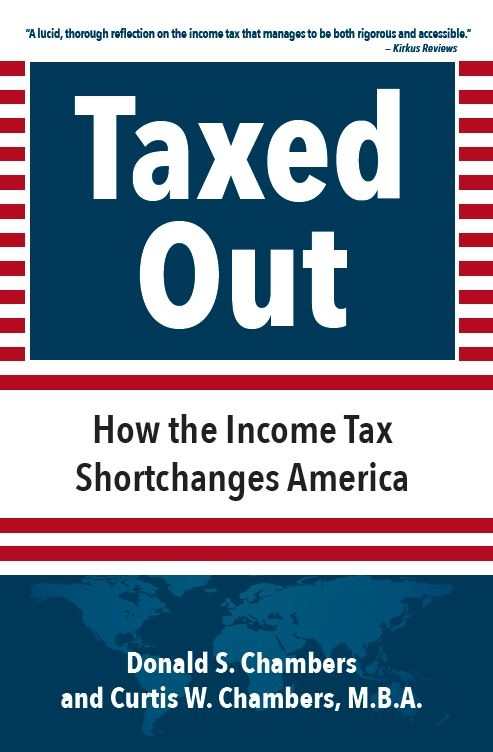
Taxed Out
How the Income Tax Shortchanges America
Well organized and written, Taxed Out lays out a plan for abolishing the income tax.
Taxed Out, by the father-and-son duo Donald S. Chambers and Curtis W. Chambers, is an innovative analysis of the federal income tax with a subtitle nearly as long as the book itself. It is presented as well researched and its argument is clear and succinct.
The authors are not economists, but their assessment of the federal income tax system is not hampered by this lack of formal training. They argue that the tax, although generally and historically perceived as a tax on individual income, operates much like a national sales tax. It makes domestically produced goods more expensive in the global marketplace, putting US corporations at a disadvantage with their foreign counterparts. At another point, they argue that the income tax operates like a tariff on domestic goods, again making them more expensive in foreign markets.
They conclude that if the federal income tax were eliminated, employers would be free to pay workers the net amount they would have received under the income tax, thus lowering wages. In theory, the authors assert, lower wages means a lower cost of goods made and thus lower, more competitive prices for those goods.
The authors offer several examples supporting their thesis. For instance, they explain that an autoworker earning $40,000 might pay $5,000 in income taxes. Without that $5,000 tax, the employer could pay the worker $35,000 and he or she would receive the same net wage. The employer then could then reduce the price of the automobile manufactured accordingly due to the reduced cost of labor.
The book, numbering just seventy pages, is well organized and well written. The authors are adept at presenting their case in clear forceful language, using boxes illustrating main parts of their presentation. Many important points are repeated for emphasis.
However, the title of this long pamphlet promises in its subtitle to explain why a new tax, either a national sales tax or a value added tax, would restore jobs and prosperity. While the authors make a run at explaining the alternative taxes, they never fully enunciate a clear policy that supports either theory as a means of creating jobs and restoring prosperity. In essence, they argue primarily for lower wages.
They mention in passing that it has been proposed that the federal income tax be eliminated and not replaced with a new tax. Since the income tax provides about 45 percent of all federal revenue, this argument asserts that the government would be able to continue its essential operations on the remaining revenue. And, at one point, the authors acknowledge the relative tax burden in the United States currently is lower than in several European countries, measured as a percentage of Gross Domestic Product.
The authors are correct in their conclusion that government is necessary to civilization and taxes are necessary to fund the government. The real question is how much and what kind of government to fund. This book will be of particular interest to those who already believe in a small, limited national government. If this book is read to begin a serious discussion of that question, then it is a worthwhile read.
Reviewed by
John Senger
Disclosure: This article is not an endorsement, but a review. The publisher of this book provided free copies of the book and paid a small fee to have their book reviewed by a professional reviewer. Foreword Reviews and Clarion Reviews make no guarantee that the publisher will receive a positive review. Foreword Magazine, Inc. is disclosing this in accordance with the Federal Trade Commission’s 16 CFR, Part 255.
